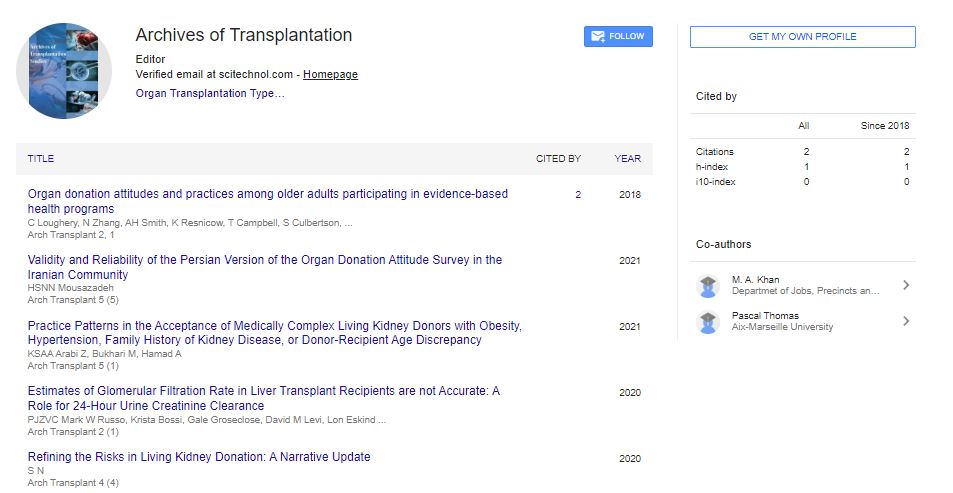Commentary, Arch Transplant Vol: 7 Issue: 1
The Intersection of Bioethics and Healthcare
Elias Teklie*
Department of Clinical Pharmacy, Jordan University of Science and Technology, Irbid, Jordan
*Corresponding Author: Elias Teklie
Department of Clinical Pharmacy, Jordan University of Science and Technology, Irbid, Jordan
E-mail: teklie34@gmail.com
Received date: 17 February, 2023, Manuscript No. AT-23-96349;
Editor assigned date: 20 February, 2023, PreQC No. AT-23-96349 (PQ);
Reviewed date: 06 March, 2023, QC No. AT-23-96349;
Revised date: 13 March, 2023, Manuscript No. AT-23-96349 (R);
Published date: 20 March, 2023, DOI: 10.4172/AT.1000131
Citation: Yang T (2023) The Intersection of Bioethics and Healthcare. Arch Transplant 7:1.
Description
The field of bioethics has long been concerned with ethical issues arising from advances in medical science, including questions about the appropriate use of emerging technologies, the allocation of healthcare resources, and the rights of patients and research subjects. However, bioethics is increasingly recognizing the ways in which healthcare disparities and social inequalities intersect with these ethical issues, and the urgent need to address these disparities in order to promote health equity and social justice.
Health disparities are differences in health outcomes and access to healthcare that are influenced by social, economic, and environmental factors, including race, ethnicity, gender, socioeconomic status, and geographic location. These disparities are not only unjust, but they also have profound consequences for public health, as individuals and communities that experience these inequities are more likely to suffer from chronic illnesses, have poorer health outcomes, and have reduced access to preventive and curative health services.
Furthermore, health disparities are often the result of broader social inequalities that affect individuals and communities in multiple domains of life, including education, employment, housing, and transportation. For example, individuals who live in neighborhoods with poor air quality and limited access to healthy foods are more likely to experience health problems related to environmental toxins and poor nutrition.
Bioethics and health disparities
Bioethics has an important role to play in addressing health disparities and promoting health equity. One of the key ethical principles of bioethics is justice, which requires that healthcare resources be allocated fairly and equitably, with a particular emphasis on those who are most vulnerable and marginalized. Bioethicists can work to identify and address the structural and institutional barriers that contribute to health disparities, such as discriminatory healthcare policies, inadequate healthcare funding, and inadequate access to healthcare services in underserved communities.
In addition, bioethics can help to ensure that emerging medical technologies are developed and used in ways that promote health equity, rather than exacerbating existing health disparities. For example, bioethicists can consider the potential impacts of genetic testing and gene editing technologies on vulnerable populations, and work to ensure that these technologies are not used to perpetuate discrimination or stigmatization.
While bioethics has an important role to play in addressing health disparities, it is important to recognize that health equity is ultimately a matter of social justice. This requires addressing the underlying social and economic inequalities that contribute to health disparities, including poverty, discrimination, and unequal access to education and employment opportunities.
Furthermore, promoting health equity requires a collaborative and interdisciplinary approach that engages not only bioethicists, but also healthcare providers, policymakers, community leaders, and individuals and communities affected by health disparities. This approach must also involve a commitment to ongoing research and evaluation of interventions aimed at reducing health disparities and promoting health equity.
Conclusion
Addressing health disparities and promoting health equity is an urgent ethical imperative for the field of bioethics. By working to identify and address the underlying social and economic factors that contribute to health disparities, and by promoting fair and equitable healthcare policies and practices, bioethicists can help to promote health equity and social justice for all. However, achieving health equity will ultimately require a broader commitment to social justice and a collaborative, interdisciplinary approach that engages individuals and communities across multiple domains of life.
 Spanish
Spanish  Chinese
Chinese  Russian
Russian  German
German  French
French  Japanese
Japanese  Portuguese
Portuguese  Hindi
Hindi 